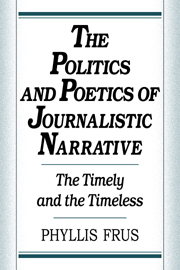Book contents
- Frontmatter
- Contents
- Preface: True Stories
- Acknowledgments
- Introduction: What Isn't Literature
- 1 Writing After the Fact: Crane, Journalism, and Fiction
- 2 “News That Stays”: Hemingway, Journalism, and Objectivity in Fiction
- 3 News That Fits: The Construction of Journalistic Objectivity
- 4 Other American New Journalisms: 1960s New Journalism as “Other”
- 5 The “Incredibility of Reality” and the Ideology of Form
- 6 Freud and Our “Wolfe Man”: The Right Stuff and the Concept of Belatedness
- Conclusion
- Notes
- Works Cited
- Index
5 - The “Incredibility of Reality” and the Ideology of Form
Published online by Cambridge University Press: 14 September 2009
- Frontmatter
- Contents
- Preface: True Stories
- Acknowledgments
- Introduction: What Isn't Literature
- 1 Writing After the Fact: Crane, Journalism, and Fiction
- 2 “News That Stays”: Hemingway, Journalism, and Objectivity in Fiction
- 3 News That Fits: The Construction of Journalistic Objectivity
- 4 Other American New Journalisms: 1960s New Journalism as “Other”
- 5 The “Incredibility of Reality” and the Ideology of Form
- 6 Freud and Our “Wolfe Man”: The Right Stuff and the Concept of Belatedness
- Conclusion
- Notes
- Works Cited
- Index
Summary
This is the story of one's hero, and then, thanks to the intimate connexion of things, the story of one's story itself … and the latter imbroglio is liable on occasion to strike me as really the more objective of the two.
– Henry James, The Art of the NovelI was driving around the Great Plains looking at different things and I went to the Clutter house in Holcolmb, Kansas. It was kind of spooky walking around out there until I thought of Truman Capote out there on the plains, doing his reporting on their murder. This tiny figure in this landscape. And this big book he was carrying around. And I couldn't help thinking – you know, if he had written that in as well – himself, small, running round – who knows, his entire book might've been different.
– Ian Frazier, author of Great Plains (quoted in Als)One of the common explanations for writers' new or revived interest in producing journalistic narratives is that in such modes they do not have to win the reader's consent to suspend her disbelief. A writer like Tom Wolfe assumes there is a built-in interest factor when the reader knows that “all this actually happened” (Introduction 34). Others agree that journalism is easier to produce, for the plot and characters are there for the taking, and the writer does not have to tax her powers of invention (Mailer, Pontifications 174–5; Malcolm, Journalist 153).
- Type
- Chapter
- Information
- The Politics and Poetics of Journalistic Narrative , pp. 157 - 195Publisher: Cambridge University PressPrint publication year: 1994



